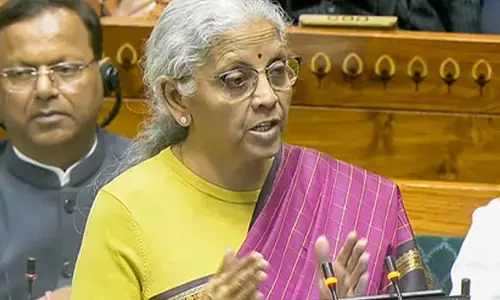High-risk newborns more prone to delayed development, disability

High-risk newborns more prone to delayed development, disability. High-risk newborns, such as those with very low birth weight (LBW), premature babies, infants with severe infections and jaundice are more susceptible to developmental delays and subsequent disability than healthy newborns, say Indian researchers, highlighting the gap in early diagnosis in rural settings.
High-risk newborns, such as those with very low birth weight (LBW), premature babies, infants with severe infections and jaundice are more susceptible to developmental delays and subsequent disability than healthy newborns, say Indian researchers, highlighting the gap in early diagnosis in rural settings.
.jpg)
Developmental delay refers to a child not achieving developmental milestones at the right age. These milestones refer to sets of functional skills or age-specific tasks that most children can do in a certain age-range. Delays may be in physical ability or cognitive ability. Identifying such lags and intervening early can prevent disability largely in children and reduce the burden in India, say experts.
The experts' observations are based on a study done in West Bengal's Purulia district, one of the most backward and impoverished regions of the state located in the remote, tribal belt. "Incidence of developmental delay among high-risk newborns is significantly high with low birth weights, prematurity and neonatal illnesses being major contributors," developmental paediatrician Nandita Chatterje, said.
"These children with developmental delay are not being diagnosed early in the rural areas, leading to developmental challenges and disability in later life," he said. Published the ‘Journal of Public Health Research’, the study was carried out with field-based tracking and neuro-developmental screening of high-risk newborns discharged from the ‘Special Neonatal Care Unit’ (SNCU) of the Purulia district hospital.
"In this study, we examined children mostly up to three years of age. We picked up a good number of children with early signs of developmental delay and evolving cerebral palsy," Chatterjee said. The spectrum of challenges included motor deficits (difficulty in mobility) such as cerebral palsy, cognitive deficits (intellectual development) like mental retardation, hearing and speech defects, visual defects, behavioural defects including autism, attention deficit hyperactivity disorder (ADHD) and the like.
Population studies expert from ‘Kolkata’s Indian Statistical Institute’, Partha De, said, “Under-nutrition and mental stress on the pregnant mother also impacts the infant's development.” India has 2.04 million disabled children aged between 0 and 6 years. Around 71 per cent of them - 1.45 million are in rural areas, as per the 2011 Census.
“Given the magnitude of the problem, it becomes important to develop guidelines to provide services for the effective diagnosis, care, understanding the cause, management, treatment and prevention of various types of developmental challenges among children in India,” De noted.




